GEM Conference 2023: Big Impacts from Small Changes: Equality, Diversity & Inclusivity at Wakefield Museums & Castles
In 2022, Wakefield Museums & Castles established a cross-team Equality, Diversity & Inclusivity (EDI) working group, which developed an Action Plan to improve access and inclusion across our service.
Working with colleagues in Wakefield Council and external partners, we have introduced a wide range of measures to make our sites and programming more inclusive, accessible, and welcoming. Accepting that we can’t do everything at once, we’ve committed to making small changes that achieve big impacts for visitors.
Background
Wakefield Council implemented a new EDI Action Plan in 2022 and as a team, we decided to implement our own Action Plan, which aligned to the wider council plan but included specific actions for our service.
An external audit of our displays and interpretation, carried out by Cassie Herschel-Shorland in early 2022, provided the impetus for discussions between curatorial, learning and visitor services staff. These discussions were formalised into an EDI Working Group, which meets regularly to develop, implement, and report on our Action Plan.
We weren’t starting completely from scratch. We had begun to make positive steps to promote inclusivity, including using Makaton in family activities and site trails, and offering additional resources at our sites such as ear defenders and blackout tents. But we knew that we would have more impact if we formalised our efforts, with SMART actions, agreed roles and responsibilities, and dedicated resources assigned to EDI.
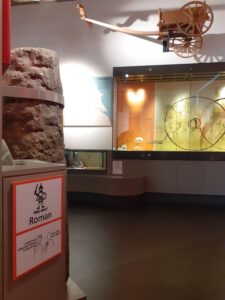
Challenge
To develop achievable and sustainable EDI actions that would:
- Align to wider council priorities.
- Support our current audiences and encourage new audiences to engage with us.
- Encourage colleagues to come on the journey with us.
- Consider limitations of our sites, infrastructure, and budgets.
Approach
Our main approach is aligned to five council EDI priorities:
- Demonstrate visible leadership and commitment to EDI across the district.
- Work with diverse communities to foster good relations, eliminate discrimination and embed equalities in policy and practice.
- Ensure our services are responsive, accessible, and inclusive.
- Build a skilled workforce that demonstrates inclusive behaviours and values.
- Recognise and ensure that EDI is everyone’s responsibility.
Intended Outcomes
- To provide greater support, resources, and information to our visitors, to enhance their visit and levels of engagement.
- To encourage non-users to visit our sites, knowing their needs would be met.
- To involve external partners and diverse communities in our work so we could all benefit from working together.
- To support our staff to feel confident and informed about EDI.
Intended Outputs
Pre-visit access information on our website, including visual stories and sensory maps.
- At least 22 sessions programmed for families with SEND.
- Training for Visitor Services Assistants in Makaton and increased use of Makaton at our sites.
- Relaxed openings at our sites.
- Enhanced children’s interpretation at Wakefield Museum.
- An increased number of resources on-site for visitors to pick up and use, rather than needing to ask for them.
- Improved staff awareness around sight loss and visual impairment.
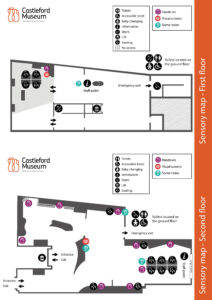
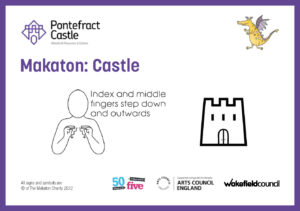
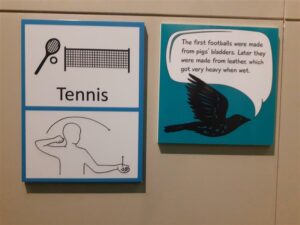
Obstacles and issues
- Changes to council IT infrastructure and webpages.
- Staff workloads and changing priorities.
- Logistics of organising training for staff.
- Procurement and procedures to progress projects.
- Finding the ‘gatekeepers’ for communities and maintaining regular contact.
Actual outcomes
To date Wakefield Museums and Castles have:
- 426 people have taken part in SEND programmed activity over a period of 18 months. One visitor commented “[I’m] delighted to see the SEN sessions & would have come sooner if [I’d] seen sooner.”
- We have attended local disability partnership meetings, leading to our sites being visited by members of Lift up Friends to assess displays and provision.
- We have connected with the Thomas Pocklington Trust and West Yorkshire Sight Loss Council, who have visited four sites to review access for visitors with sight impairment or who are blind and delivered training. Pontefract Museum enhances accessibility – Sight Loss Council (sightlosscouncils.org.uk)
- We have continued working with a local Makaton ambassador to ensure accuracy of content used. Adding Makaton into site trails had received positive feedback: “The @MakatonCharity signs are such a lovely touch of inclusivity. Well done”
- We have established connections with local young people’s groups to increase input in new site development, with one commenting, “so excited to get this ball rolling and for us to help increase Queer representation in our local history.”
- We have improved access to self-led resources for visitors when on site, with one parent commented “was really nice to see a SEN clam space / den for my child”
Actual outputs
- Lift Up Friends and West Yorkshire Sight Loss Council have assessed our sites and provided feedback that has informed our Action Plan.
- Our sites now have Makaton signage (35 signs in total), developed in collaboration with the Makaton ambassador.
- 17 targeted SEND family activities have been delivered, and this offer has become a core part of our programming.
- Visual stories, site plans and sensory maps for our sites are now available online to support visits.
- ‘Pick and Mix’ units, offering resources to support SEND and sensory needs, are available at our museums for visitors to collect and use as they need.
- Castleford Museum offers ‘Relaxed Fridays’ each week and this will be rolled out to our other sites.
- 19 new ‘Fun Facts’ signs for children have been installed at Wakefield Museum to support playful exploration.
- 27 staff completed Visual Impairment Awareness training and two staff completed Level One Makaton training.
- Online content has promoted inclusivity by sharing diverse voices, such as local LGBTQ+ stories.
Lessons learned
- Our 2023 Action Plan was ambitious, which reflected our enthusiasm and desire to make changes, but plans need to be realistic and take other priorities into account.
- Project work has progressed much better than some of the more general actions. Keeping actions SMART and assigning responsibilities helps to ensure they are achieved.
- It hasn’t been easy to disseminate information to the wider staff team or receive insight back from the team. We need to find ways to improve this two-way communication.
- We can’t assume that potential audiences know where to find information about our EDI work – we need to identify the best ways to communicate our offer to new audiences.
- Inclusion is wide-ranging and can be achieved with even small details. We received great feedback about providing Free From chocolates at our Dragon Egg event for those with allergies or intolerances. “Little win for allergy life today! ….@moo_free_chocolates eggs as a reward for completing the hunt!! #freefrom eggs, just there! Alongside the regular eggs, complete with listed allergens! Huge thank you …. for being inclusive! ….”
- We can’t do it all, and that’s OK!
Next Steps
Our EDI Working Group will continue to meet regularly to review our 2023 Action Plan and begin drafting our 2024 Action Plan. Our EDI lead feeds back to the wider Wakefield Council EDI Board and we will continue to ensure we align to council priorities.
We will continue to develop connections with local communities and groups to inform future programming and development.
Evaluation is key and we will be looking at improving how we gather feedback from visitors and staff on the impact of our EDI work. This feedback and evaluation will then inform future plans.
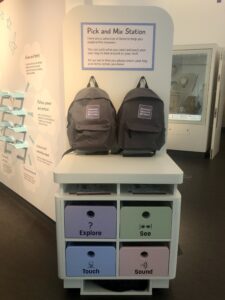
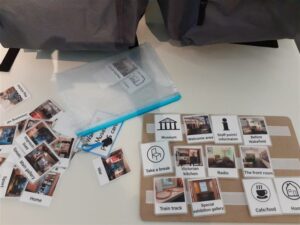
Louise Bragan
Senior Officer: Programming & Learning
https://www.wakefield.gov.uk/museums-and-castles/
Twitter:
